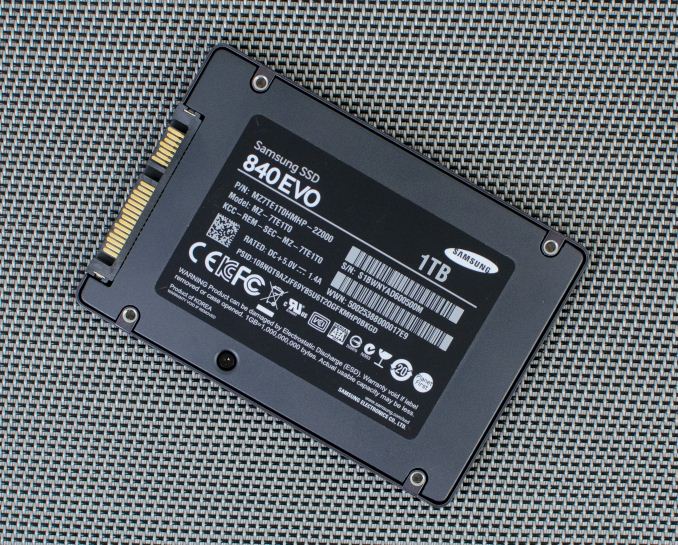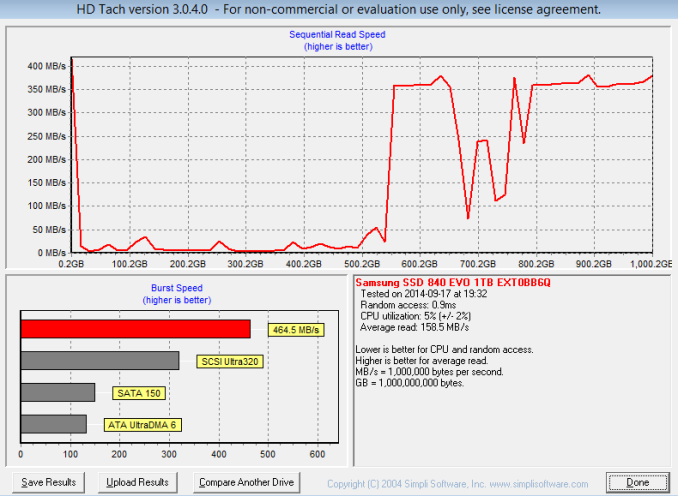Samsung Acknowledges the SSD 840 EVO Read Performance Bug - Fix Is on the Way
by Kristian Vättö on September 19, 2014 3:23 PM EST
During the last couple of weeks, numerous reports of Samsung SSD 840 and 840 EVO having low read performance have surfaced around the Internet. The most extensive one is probably a forum thread over at Overclock.net, which was started about month ago and currently has over 600 replies. For those who are not aware of the issue, there is a bug in the 840 EVO that causes the read performance of old blocks of data to drop dramatically like the HD Tach graph below illustrates. The odd part is that the bug only seems to affect LBAs that have old data (>1 month) associated with them because freshly written data will read at full speed, which also explains why the issue was not discovered until now.
Source: @p_combe
I just got off the phone with Samsung and the good news is that they are aware of the problem and have presumably found the source of it. The engineers are now working on an updated firmware to fix the bug and as soon as the fix has been validated, the new firmware will be distributed to end-users. Unfortunately there is no ETA for the fix, but obviously it is in Samsung's best interest to provide it as soon as possible.
Update 9/27: Samsung just shed some light on the timeline and the fixed firmware is scheduled to be released to the public on October 15th.
I do not have any further details about the nature of the bug at this point, but we will be getting more details early next week, so stay tuned. It is a good sign that Samsung acknowledges the bug and that a fix is in the works, but for now I would advise against buying the 840 EVO until there is a resolution for the issue.











116 Comments
View All Comments
tim851 - Saturday, September 20, 2014 - link
Crucial M550, available as 2.5" SATA drives and M.2 SATA modules.TimJWatts - Sunday, October 5, 2014 - link
Crucial M550TimJWatts - Sunday, October 5, 2014 - link
No - scrub that (Crucual M550) - serious queued TRIM bug:http://forum.crucial.com/t5/Solid-State-Drives-SSD...
https://bugzilla.kernel.org/show_bug.cgi?id=71371
and no firmware releases from manufacturer for the M550 series.
Oh well, better check out the Transcend MSA370 and see if that has any nasties.
SanX - Sunday, September 21, 2014 - link
What's amazing is here? It sometimes slows down to *seconds* of waiting which looks like 1 bit per second speed? I stopped using this sh!tTimJWatts - Sunday, October 5, 2014 - link
Sorry mate - damage done. I was slightly[1] tempted by the Evo 840 until due diligence searching found the overclock thread on this subject.[1] Until I realised it was TLC tech - but I was balancing that against Samsung who usually don't mess up - until now.
If Samsung had acknowledged early, and promised a fix was being worked on asap, I would have forgiven them. But I hate the stony corporate silence. There are alternatives, so I will be going with the Crucial M550. I'd be happiest with a Sandisk X110 but sadly not available in 515GB in mSATA.
TimJWatts - Sunday, October 5, 2014 - link
Re Crucial M550 - bug alert, see my post just previous to this one.hojnikb - Friday, September 19, 2014 - link
Finally some more coverage of this. Hopefully they issue a fix for this soon.Although one thing i do wonder; could this be an issue with the TLC flash itself ?
I mean, its already really small (being 19nm) and having 8 states, that surly affects data retention or atleast accessing stuff, that has already lost some charge.
Even if they manage to fix this with firmware, that doesn't rule out TLC as the main cause of this. They could tweak garbage collection in a manner, that shits around older data, so it stays "fresh".
hojnikb - Friday, September 19, 2014 - link
*shiftsSilly me :)
Kristian Vättö - Friday, September 19, 2014 - link
My theory is that the NAND management algorithms don't take the changes in cell charges into account properly. Electrons leak through the silicon oxide over time, which may result in a change in the voltage state of the cell. That in turn would return an incorrect bit output when read, so the data must be recovered using ECC/parity, which makes it readable but the calculations take time and that translates to poor performance.hojnikb - Friday, September 19, 2014 - link
If this is indeed correct (although we're really just speculationg here) could this also potentially mean, that if there are lots of really old data on the drive that could translate to curruption ? I mean, ECC can only recover so much and if this does indeed get worse over time, curruption is quite possible. Atleast thats what i think